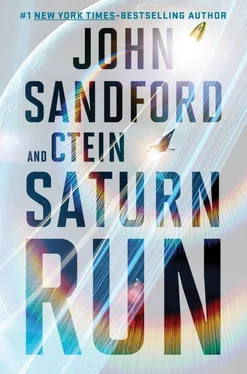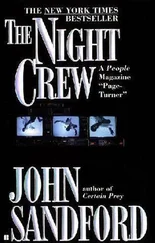Will Jackson was the three-star general who ran the NSA, and Grendel was their fastest sorting computer.
Mellis continued: “Jackson checked with the orbit guys here. They hadn’t heard those numbers, and were under the impression that Johansson and her people had to do more studies to come up with a precise number, and those studies might take a while—a week or two. Our question here is, did Johansson ever mention those precise numbers? The Grendel results show quite a bit of conversation with various people down here, including the President’s circle, where an increase in velocity has been discussed, but only in terms of projected arrival dates. I’m told it’s possible that the Chinese intercepted some of that data and extrapolated the power boost, but that’s pretty unlikely. If they did get it here and extrapolate it, it’d mean that they’ve got a source pretty close to the President, which would also be… discomfiting. So that’s where we’re at, man. Over.”
Crow said, “Johansson mentioned something like those numbers—I think those exact numbers, I’ll check—in a meeting here a week or so ago. She was pulling the numbers out of her butt, more or less, nothing she’d want to go on the record with. I think we’ve got a Chinese asset on board. The meeting room has been heavily scanned for bugs, but just inner-ship chatter could have picked up the numbers. What’s happening with the re-scan on the crew?”
He waited, and waited, and then Mellis was back:
“We are shredding the crew, but we’re not seeing anything that we didn’t already know. I’m telling you, we did a first-rate job the first time through. The only thing new is that you’ve got a guy there, Cary Roth, microbiologist, cross-trained as a medic and welder, degrees in biology from Iowa State and Texas. Twenty-two years ago, somebody cracked a safe in the controller’s office at Iowa State and stole forty-eight thousand dollars. Police thought it might have been Roth, more for proximity reasons than anything. He had a part-time job there—I’ll ship you all the details—but he was never arrested, charged, or even spoken to harshly. If he did it, he got away with it. That’s about it, it’s nothing that the Chinese could use as a lever or even know about. I really think that if you’ve got somebody up there, it’s a paid asset, not an ideological one. Not something we’re going to find out by pushing their background.
“On the other hand, we’re seeing nothing on the financial side. This is one of the cleanest bunch of people I’ve ever seen. Maybe a little fooling around with income taxes, but nothing that would push a guy into Beijing’s lap. Almost all of them are salaried, and they get good salaries, and the IRS knows what they get down to the penny, and they are living within their means. We’ve traced them all the way back to their birth dates, we’ve looked at their school yearbooks and their grade records, we’ve talked to people who remember them from kindergarten, photos from unrelated people, vids of Little League games. The original work we did still looks good. So, uh… that’s what we got, long files to follow on the data links. We need ideas. Over.”
Crow: “I’m burning out my brain here, Fay. If there’s a spy on board, they’ll want him to have some access to communications. I kinda don’t think we’ll find it, but if you guys develop any reasonable ideas, let me know. Maybe they had to do something in a hurry, and they built a link into our outgoing data streams. I doubt that they’d have any kind of a regular schedule—if there’s a schedule at all, it’s randomized and linked to a one-time pad that we won’t find.
“Most likely there is no schedule: they’ve set up a link that can be used anytime, but that they’ll only use for something urgent. We’ve got three big data links coming out of here, but I’d look particularly at the low-bandwidth omni-directional antenna carrying the black-box data from the ship. Nobody’s going to look at the black-box signal unless we blow up, so if they’re going out through one of the antennas, I suspect that’s the one they’d choose. We need to do an analysis of the black-box signal all the way from Earth orbit to here. If there’s an encrypted message buried in the black-box signal, I suspect it’ll be disguised as noise, so you need to tell the guys to look specifically at the noise. The optical link is a lot cleaner, so it’d be harder to hide a signal there, but there’s also so much data that a full analysis might not be feasible. If it is feasible, then do it. But to tell the truth, I don’t think we’ll find anything. Over.”
He waited a while for the reply, then Mellis came back:
“We can run the data screens, but we’re gonna need more money. That’s a lot of data to look at, and we’re gonna need access to Grendel again, and you know how those guys get about that. Over.”
“You’ll get it. Jackson is aware of Santeros’s interest. Over. And out, unless you’ve got something else.”
Mellis had nothing more. Crow called Johansson, asked her to switch to encryption, and put the question to her. Had she mentioned those numbers anywhere outside the meeting room?
“Well, sure, here in Engineering,” Becca said. “We’ve been trying to figure out what we might do, and if it makes any sense to do it. But we’re sort of backing up on the numbers. I don’t think four percent is at all feasible anymore…. But to go to your question, I mentioned those specific numbers only in that meeting. Here in Engineering, we’re pretty aware that it’s a range, not a specific number.”
“Huh. Becca: thank you. You’ve been a help.”
And she was gone.
Elroy Gorey and Joe Martinez were sitting in the garden—a space dedicated to hydroponics, growing lettuce, cabbage, spinach, kale, arugula, tomatoes, cucumbers, and peas, all overlaid with the light stink of fertilizer—and working through a few country tunes, Martinez on guitar, Gorey on fiddle. Crow showed up with his bass, plugged in, and they rocked along for twenty minutes or so.
When they took a break, Martinez asked Crow, “You ever going to find that Easter egg?”
Crow shook his head: “I don’t expect so. There’s still some smart guys working on it, but the thing is, what we’ve found out is that there are a lot of undetectable ways of doing what was done. That we could scrape the computers clean, and there are ways they could still get at us.”
Gorey: “So the other reactor… that could go out, too?”
Crow shook his head: “We don’t think so. We’re not entirely sure, but we suspect there may be some kind of physical component to this whole thing. That it might not be purely software. But we don’t know.”
“Wish you would,” Martinez said. “I don’t like running on one cylinder.”
“Neither do I,” Crow said.
“The thing is… the whole competition doesn’t make any sense,” Gorey said. “If we get out there first, or the Chinese get out there first, and one of us gets amazing tech, what’s the winner going to do with it? If the Chinese build a time machine, our intelligence guys will have the specs in three weeks, anyway.”
“Yeah? What if they go back through time to, like, 1200 A.D. and they discover North America, and when Columbus shows up, it’s wall-to-wall Chinese?” Martinez asked.
“Won’t be any time machines,” Gorey said. “We’re right at the end of physics. Everybody knows it. Not much left, and one of the things that’s not left is time travel.”
“Good thing, too,” Crow said. “We’ve fucked up about everything else we’ve touched, we don’t need to fuck up the time stream.”
Sandy stuck his head in the door and asked, “Tomato?”
Читать дальше








